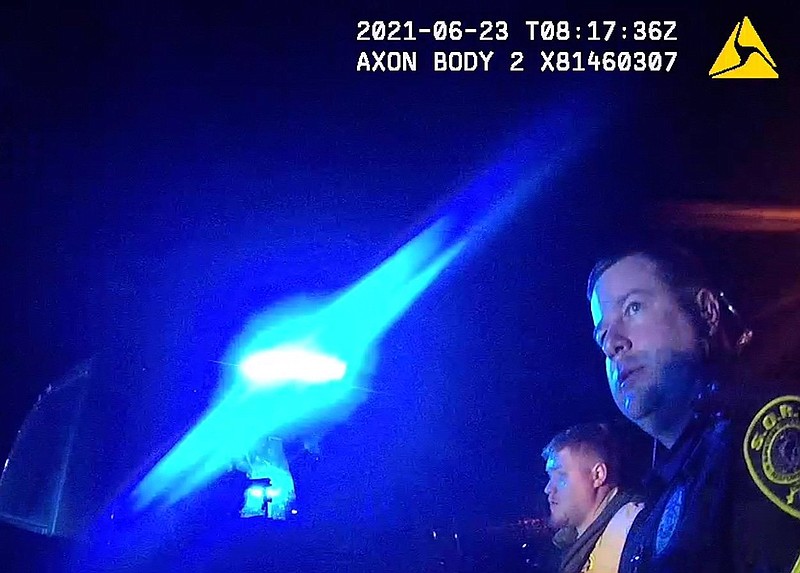The Lonoke County deputy who shot and killed 17-year-old Hunter Brittain on June 23, 2021, had a mental illness and hadn't taken his medication, according to a lawsuit filed Thursday by two civil-rights lawyers.
Sheriff John W. Staley knew that Deputy Michael C. Davis had a mental illness, according to the lawsuit filed in federal court in Little Rock by Ben Crump and Devon M. Jacob.
"Sheriff knew that if Davis failed to take his medication as prescribed, he would not be emotionally stable and would be a danger to the public," according to the suit. "Sheriff did not supervise Davis to ensure that he took his prescribed medication as required. Sheriff's failure to supervise Davis' known mental health issue permitted Davis to patrol for approximately two weeks, including the date that Davis shot and killed Hunter. Davis' failure to take his medication as prescribed directly caused his emotional instability that caused him to unlawfully shoot and kill Hunter."
"I don't think the evidence will bear that allegation out," said Robert Newcomb, the attorney who represented Davis during his criminal trial, in an interview. "I'm not really sure what Mr. Davis had would meet the definition of mental illness under the [Diagnostic and Statistical Manual of Mental Disorders]. If that's the allegation, I just don't think they're going to be able to prove it from what I know. From what I understand, regarding the medication he was taking on occasion, failure to take it that day, medical professionals would not have found him unfit for duty."
Staley is named as a defendant in the suit, along with Davis and another deputy, Nathan Rice. Staley was sued as an individual and in his official capacities as sheriff.
The plaintiffs are Brittain's grandmother, Rebecca C. Payne; James L. Crowder; and Michael D. King, the legal guardian of JLK, a minor who was in the pickup with Brittain when he was shot by Davis.
The plaintiffs allege 14 violations of state or federal law, ranging from false imprisonment to wrongful death. They are seeking compensatory and punitive damages and requesting a jury trial.
A jury on March 18 convicted Davis of misdemeanor negligent homicide in the fatal shooting of Brittain during an early morning traffic stop.
Brittain, JLK and Crowder had been working on Brittain's white GMC Sierra pickup at Mahoney's Body Shop just south of Cabot, according to the lawsuit.
Brittain and JLK took it for a test drive around 3 a.m. Davis began following the vehicle and turned on his blue lights as Brittain steered the pickup onto the driveway of the body shop.
Brittain was unable to shift the truck's transmission into park, so he got out and walked to the bed of the truck to retrieve an antifreeze container to put behind a wheel to keep the truck from rolling, according to the lawsuit.
"Without warning, Davis exited his vehicle and fired a bullet from his duty weapon into the lower right side of Hunter's neck," according to the suit. "Davis admits that just prior to discharging his firearm, he could not see Hunter's hands or if anything was in his hands. Hunter fell to the ground and a large bright blue plastic bottle of antifreeze landed next to him."
Davis had been a deputy in Lonoke County since 2013, according to the lawsuit. He was commissioned by the state as a law enforcement officer, police professional instructor and field training officer. In 2020, Davis was promoted to the rank of sergeant.
"Through Davis' training, certifications, and sheriff policies, Davis knew that before using force, he was required to verify a credible threat (not assume one)," according to the lawsuit.
Davis didn't identify himself or issue a warning before firing, according to the lawsuit.
According to the lawsuit, the sheriff's policy states, "Every applicant for employment by the department must be examined for emotional stability and physical condition by an individual licensed and qualified to perform the examinations. The examiners shall make recommendation to the employing agency concerning the applicant's suitability for employment. ... If a mental health examiner indicates the presence of a condition that could limit the deputy's mental ability to cope with the stress of law enforcement duties, he/she will not be eligible for certification as a law enforcement officer with this department."
Staley was required by state law to ensure that Davis was psychologically fit for duty, according to the lawsuit.
"Sheriff knew that Davis was considered overly eager during his field training," according to the suit. "Sheriff knew that Davis suffered from mental illness during his employment. Sheriff knew that Davis was required to take prescribed medications for his mental illness. ...
"Sheriff knew that his own failure to supervise Davis is what caused Hunter's injuries and death," according to the suit. "To cover up his own culpability, sheriff terminated Davis' employment without conducting a proper and complete internal affairs investigation. To cover up his own culpability, sheriff did not terminate Davis' employment because he unlawfully shot and killed Hunter. Instead, sheriff terminated Davis' employment because Davis failed to turn on his body camera. Stated another way, sheriff terminated Davis' employment because Davis failed to record the unlawful killing; not for engaging in the killing."
